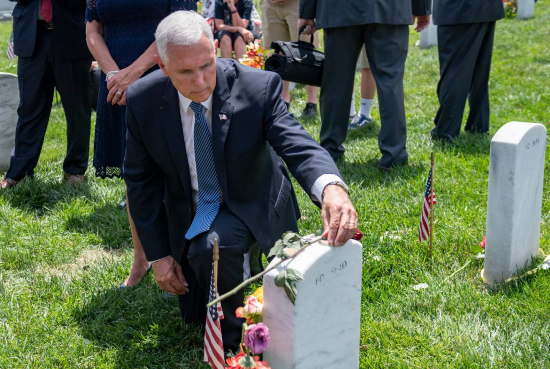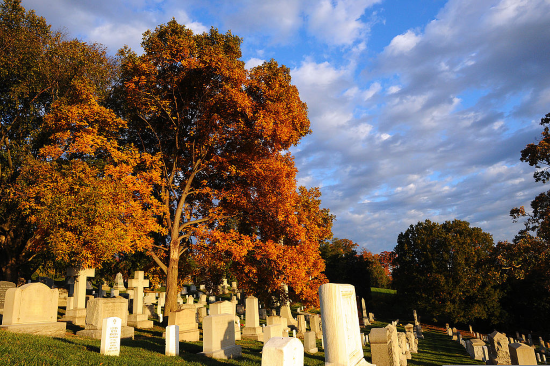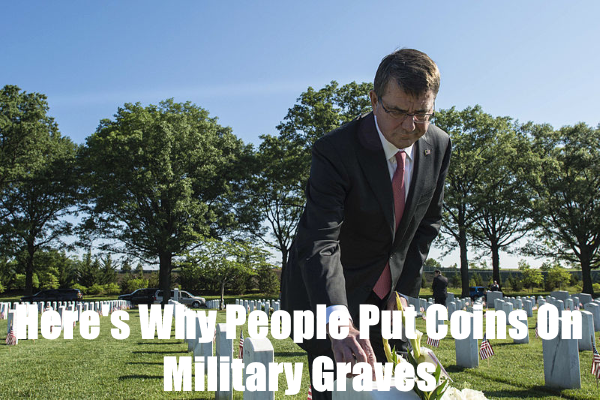If you have ever visited a war memorial or cemetery with headstones marking the graves of veterans, you may see coins of different denominations left at these grave sites.
These coins symbolize honor, respect, and remembrance for those who have given their lives in service to the U.S. military.
Leaving a particular coin on a military grave or headstone is part of a tradition that allows visitors to pay their respects to the deceased and let their surviving loved ones know they are thinking of them.
Here’s why people put coins on military graves and the meanings behind them.
Related Article – How To Properly Salute In The Military
Table of Contents
Origins Of Coins On Military Graves Tradition

Placing coins on the burial sites of military members likely began in Ancient Greece.
In Greek mythology, the dead had to cross the River Styx via ferry or be stranded wandering the shores for a century as a ghost.
However, the ferryman, Charon, demanded a toll from each of the dead spirits to cross the Underworld’s river.
Therefore, to ensure a safe crossing, family members of the deceased would often place coins in the mouth or eyes of the dead in Ancient Greece.
This practice of leaving coins to protect and honor the dead continued through the Roman Empire, eventually spreading throughout western Europe and eastward.
The tradition has been adapted across time, region, religion, and culture.
In addition to coins, there are many tokens that have historically been left at burial sites, including flowers, rocks, trinkets, and other mementos.
However, the origins of coins left with the dead in Ancient Greece have led to our modern tradition of leaving coins at the burial sites of fallen military members.
Modern Coin Tradition
Coins have been left at the burial sites of U.S. service members since the inception of the military.
However, the tradition of leaving a coin at the grave of a fallen veteran became a more common practice in the U.S. during the Vietnam War.
It is believed that this was a result of the political divisiveness of that conflict.
Fellow service members may have been reluctant to reach out to family members of the deceased during that time.
Therefore, leaving a coin was a practical method of communicating that you had visited a service member’s burial site to acknowledge your respect and remembrance.
In addition, some Vietnam veterans would leave coins as a symbol of an agreement to buy their deceased comrade a beer or play a game of cards when reunited in the afterlife.
It’s very common for people to honor fallen military members of any era through this tradition each May, especially on Memorial Day.
You may see a variety of coins left at veterans’ burial sites over this holiday.
Other notable days when people may visit and leave coins for deceased service members include:
- Medal of Honor Day
- Vietnam Veterans Day
- Armed Forces Day
- D-Day (anniversary of World War II Allied invasion in Normandy, France)
- Flag Day
- Birthdays of Army, Navy, Air Force, Marine Corps, Coast Guard
- Purple Heart Day
- Veterans Day
- Pearl Harbor Remembrance Day
Of course, this tradition can be carried out any day of the year as long as it is is appropriate to the situation and done with great respect.
Specific Coins And Their Meanings
A coin left on a military gravesite or headstone is usually intended to reflect a message to the deceased soldier’s family and other surviving loved ones.
The basic message is that someone has visited the service member’s grave to offer their respect and remembrance.
However, it’s widely accepted today that each type of coin carries with it a distinct message about the person who has placed it and their relationship to the deceased through serving in the military.
Therefore, it’s important to understand what each denomination of coin means, as it’s understood today.
- Penny: means that a person made a visit to give thoughts and respect to the fallen military member
- Nickel: indicates that the visitor and the deceased service member were acquainted and trained together at boot camp
- Dime: symbolizes that the visitor directly served together alongside the deceased in some capacity
- Quarter: signifies that the visitor was present with the solider when they were killed
Challenge Coins
Challenge coins may also be placed on the headstones or gravesites of fallen military members.
A challenge coin is not actual currency.
These coins are unique, specially designed medallions that typically feature the emblem of a specific unit or military branch.
Challenge coins can represent unity, camaraderie, pride, appreciation, and honor.
Therefore, it is not unusual to find challenge coins of the deceased service member’s military branch on their grave.
Related Article – Army Mortuary Affairs Specialist (MOS 92M)
What Happens To These Coins?
Traditionally, the coins left at gravesites in national and state veterans’ cemeteries are eventually collected.
Challenge coins are the exception, and are often left at the grave site for years.
The money (from currency coins) is usually gathered by the caretaker and put toward cemetery maintenance.
This may include supporting funds for washing graves, mowing the cemetery lawn, and other important up-keeping tasks.
In addition, the coins may be used for funding burial costs for indigent and/or homeless veterans who cannot otherwise pay for the process.
Of course, the Department of Veterans Affairs and other charitable funds often help cover some of these costs.
However, the coins left by individuals in honor and remembrance of the deceased can be used to make up some of the difference in funeral and/or burial expenses for fellow service members that have passed.
Therefore, it’s essential that you don’t touch, pick up, and/or move any coins that you see on a military grave or headstone.
Coin Etiquette

Though it may seem unusual at first to see various coins left on the grave or headstone of a fallen military member, it is an important and long-held tradition.
These coins are left intentionally as memorials and signs of respect, often by those who had a relationship through the Armed Forces to the deceased.
If you would like to pay your respects by placing a coin on a service member’s grave, you can research whether this is permitted at the specific cemetery or memorial site.
If allowed, be aware that there is an etiquette to following this tradition.
The coin should be placed in a quiet and private manner, without disturbing anything at the gravesite or calling attention to anyone else in the area.
This tradition is meant to be an honorable and sincere method of communicating with the loved ones of the deceased service member.
As a result, such boundaries and considerations of care and respect should be acknowledged at all times.
Related Article – Protected Veteran Meaning: 6 Things To Know
Conclusion
Many cultures, religions, and nationalities embrace traditions to honor the dead long after they have passed.
The U.S. Armed Forces is no exception, and leaving coins at the burial sites of fallen men and women who have served in the military is an important and cherished legacy.
That’s why it’s essential to understand the nature and meaning of this practice.
Should you decide to take part in leaving a coin at a military grave, be aware of the proper etiquette and significance of your gesture.
Above all, be sure to show the utmost respect for this tradition, the deceased service member, their sacrifice, and their surviving family.
- Ikon Pass Military Discount: Learn How To Save Big - January 31, 2025
- RTIC Military Discount: Find Out How To Save Big on Gear - January 30, 2025
- Traeger Military Discount: Learn How To Save Big on Smokers - January 28, 2025


